“Considering where the stresses on the system are today, we’re deeply concerned that eligibility law is on a collision course with the future of medicine.” – Corey Salsberg, Novartis
After three hearings and 45 witnesses, there were few new fundamental arguments advanced for or against reforming patent eligibility law at today’s final Senate IP Subcommittee hearing on the topic, but several key—and some alarming—messages were underscored.
The Draft Will Change
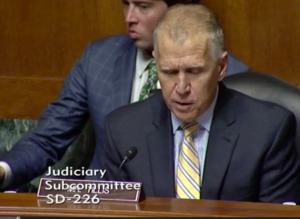
Senator Thom Tillis
A few takeaways off the bat: there are going to be considerable changes to the working draft. In particular, there were four issues that Senator Thom Tillis (R-NC) noted were raised repeatedly. First, both sides agreed the new proposed definition of “utility,” which requires “sufficient and practical utility in any field of technology through human intervention” needs to be further defined; those for reform felt that the language could be too narrowly interpreted, while those against feared it was not definite enough. “Clearly, those terms need better definition or more meat on the bones,” Tillis said.
Secondly, everyone was concerned with Section 112(f). Tillis pointed to the practical argument made by inventor Paul Morinville about the impossibility of meeting that requirement in the context of software coding language, for example, while Tillis said the tech companies were afraid the language wasn’t strong enough to weed out overbroad software and business method claims that most agree should not be patent eligible.
The third point Tillis noted indicates that there will be a research exemption written into the bill. While Tillis felt that Rick Brandon of the University of Michigan, who testified in the second hearing last week, had sufficiently dispelled the fear that the proposal would preempt broad swaths of fundamental research, he still seemed open to considering an “enhanced experimental use and research exemption.”
Finally, the gene patent argument is dead as far as Tillis is concerned, and even one of the anti-reform witnesses testifying today agreed that the continued narrative that the draft legislation would allow for the patenting of a single human gene was not the issue. Dr. Sean George, Chief Executive Officer at Invitae, a genetic testing company that was sued by Myriad Genetics in 2013, explained during the second panel of the day—perhaps more coherently than his allies in the debate—that his concern is with “method, observation, and association patents that take that genetic information and wrap it up with a disease outcome or an observation that could diagnose a patient or target that patient for a particular therapy.” George claimed that pre-2012, his industry suffered due to patent thickets around such inventions, while post-2012, “I believe the data—the actual facts—would show that the industry is currently experiencing a renaissance.” George’s view was at stark odds with other biotech companies that had testified, however.
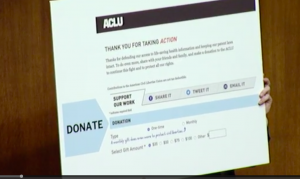 In a dig at George’s cohort in the anti-reform debate, the American Civil Liberties Union (ACLU), Tillis implied that the organization’s insistence on framing the issue in what IPWatchdog’s Gene Quinn called a “sloppy, unscientific manner” may have more to do with fundraising than substance (see image, left). “We’re not gonna touch your genes, ACLU, so problem solved,” Tillis said. He also pushed back on the assertion by some that he and Senator Chris Coons (D-DE) had packed the panel with witnesses favorable to reform, saying he felt it had been balanced, and reminding those present that they had specifically invited Apple, Google, Microsoft, Oracle and Dell, who declined to come in favor of being represented by industry associations.
In a dig at George’s cohort in the anti-reform debate, the American Civil Liberties Union (ACLU), Tillis implied that the organization’s insistence on framing the issue in what IPWatchdog’s Gene Quinn called a “sloppy, unscientific manner” may have more to do with fundraising than substance (see image, left). “We’re not gonna touch your genes, ACLU, so problem solved,” Tillis said. He also pushed back on the assertion by some that he and Senator Chris Coons (D-DE) had packed the panel with witnesses favorable to reform, saying he felt it had been balanced, and reminding those present that they had specifically invited Apple, Google, Microsoft, Oracle and Dell, who declined to come in favor of being represented by industry associations.
Panelists Paint a Dire Picture
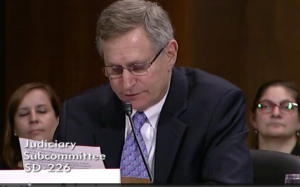
Manny Schecter
Speaking on the first panel, Manny Schecter of IBM responded to a question posed by Tillis about whether Judge Paul Michel was correct in saying that he wouldn’t be able to advise a client on Section 101 issues today by agreeing with Michel and indicating that, while it was “a bit of an embarrassment” for him to have to explain the confusion to executives, it was more importantly “a blot on the integrity of the patent system.” Schecter pointed Tillis to ChargePoint Inc. v. SemaConnect, Inc., (2018-1739) to illustrate the absurdity of present eligibility law. In Chargepoint, the Federal Circuit held an invention relating to distributed networks of charging stations for electric vehicles to be patent ineligible as an abstract idea. “If courts can get that wrong, consider [artificial intelligence] AI, where the purpose is to abstract the functioning of the human brain,” Schecter said. He also bolstered arguments made by fellow panelists, Laurie Self of Qualcomm and Byron Holz of Nokia, about the importance of patents to standard setting. Schecter, Holz and Self all stressed that eligibility law was disincentivizing companies from innovating in core technology areas crucial for national security and 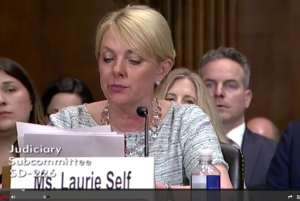 transitioning to 5G and impeding the ability of companies to participate in contributing to standards, since the lack of patents makes parties reluctant to disclose and share information.
transitioning to 5G and impeding the ability of companies to participate in contributing to standards, since the lack of patents makes parties reluctant to disclose and share information.
Sean Reilly of The Clearing House Payments Company was the sole advocate against reform in the first panel, arguing that there has been an uptick in patent quality for the financial services sector since the Bilski and Alice cases, and a decline in lawsuits based on dubious patents. Reilly suggested changing the draft language to provide an alternative to 101 that would ensure that companies could still “get out early” when faced with lawsuits and/ or expand the invalidity grounds for review in post grant proceedings at the USPTO.
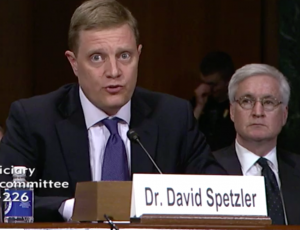 In the second panel, Laurie Hill of Genentech emphasized what many other panelists did during the hearing—that much of their technology that is ineligible in the United States is eligible in China and Europe. Her fellow panelists, Gonzalo Merino of Regeneron Pharmaceuticals, Peter O’Neill of Cleveland Clinic Innovations, and David Spetzler of Caris Life Sciences, all echoed Hill’s sentiments, and stressed the real-world impact. O’Neill said that “the uncertainty has a meaningful impact on our ability to innovate,” but still cautioned against drastic reform and advocated for a research exception.
In the second panel, Laurie Hill of Genentech emphasized what many other panelists did during the hearing—that much of their technology that is ineligible in the United States is eligible in China and Europe. Her fellow panelists, Gonzalo Merino of Regeneron Pharmaceuticals, Peter O’Neill of Cleveland Clinic Innovations, and David Spetzler of Caris Life Sciences, all echoed Hill’s sentiments, and stressed the real-world impact. O’Neill said that “the uncertainty has a meaningful impact on our ability to innovate,” but still cautioned against drastic reform and advocated for a research exception.
Spetzler’s opening statement was troubling, and worth recounting in part. He said that his company, which has spent $400 million to find cures for cancer and has made “unprecedented discoveries” had lots of examples on the company’s “long and very painful” road where foreign and domestic companies have continually infringed due to the murkiness of the law. He continued:
It fosters an environment under which we don’t share information. It is incentivizing us to keep secrets. The only effective strategy we have is to maintain our position through trade secrets which has a much longer and devastating effect on the advancement of science. Patents give us the ability to share information, broadly disseminate what we’ve learned and enable more discoveries. It’s how we’re going to change things. We have to work together – there’s no one group that can solve the problem of cancer. So without an effective manner of patenting and protecting our inventions we’re going to see a rudderless ship just spinning around.
 An equally disquieting testimony was Corey Salsberg’s of Novartis, who participated on the final panel. Salsberg drove home with candor what is at stake in this debate. Citing several examples of patent claims Novartis had lost in recent years—including a new digital microscope that was found to be abstract despite having a primary lens coupled with an image sensor; a laser device system applied to a human tissue region in surgery that was also rejected as abstract; claims to a novel pharmaceutical composition to treat arthritis made up of a modified protein that does not exist in nature, which was found to be a natural phenomenon; and several method of treatment claims—he warned that patent law may be on “a collision course with the future of medicine”:
An equally disquieting testimony was Corey Salsberg’s of Novartis, who participated on the final panel. Salsberg drove home with candor what is at stake in this debate. Citing several examples of patent claims Novartis had lost in recent years—including a new digital microscope that was found to be abstract despite having a primary lens coupled with an image sensor; a laser device system applied to a human tissue region in surgery that was also rejected as abstract; claims to a novel pharmaceutical composition to treat arthritis made up of a modified protein that does not exist in nature, which was found to be a natural phenomenon; and several method of treatment claims—he warned that patent law may be on “a collision course with the future of medicine”:
The true story of biopharmaceutical innovation is a story about risk-taking, investment, a willingness to fail, and a practical means to keep it all going on a scale that keeps yielding results. The patent system has successfully provided that means since the earliest days of modern medicine, converting a daunting set of scientific odds that included a 10 to 15-year development timeline on average and an almost 90% failure rate at the clinical stage into a viable and sustainable business model…. The trajectory is alarming. The future of our industry is that we’re moving further into biology, medicine is becoming increasingly personalized as we discover the genetic basis for disease, and we’re moving away from pills into these treatments that harness the body’s own power to fight disease and finally, software, digital tools and AI are being used for everything from optimizing R&D to virtual medicines. So, considering where the stresses on the system are today, we’re deeply concerned that eligibility law is on a collision course with the future of medicine.
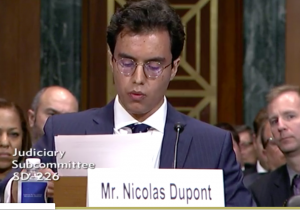 Another interesting participant in the last panel was Nicholas Dupont of Cyborg, Inc., a small business specializing in data compression software for Fortune 500 companies that holds five U.S. patents to date. Dupont founded Cyborg in 2013 as a sophomore in high school. He said that the company has on occasion resorted to trade secret protection over patents and has taken “an exceedingly prudent approach to business development and partnerships, stifling our growth potential.”
Another interesting participant in the last panel was Nicholas Dupont of Cyborg, Inc., a small business specializing in data compression software for Fortune 500 companies that holds five U.S. patents to date. Dupont founded Cyborg in 2013 as a sophomore in high school. He said that the company has on occasion resorted to trade secret protection over patents and has taken “an exceedingly prudent approach to business development and partnerships, stifling our growth potential.”
The Last Word
The 45th panelist in the series of patent eligibility hearings was John Vandenberg of Klarquist Sparkman, LLP. He took a unique approach to the debate and suggested that the senators consider asking some of the companies involved to propose legislation that would overturn Mayo but not Ariad and Myriad, “even if they don’t think that’s the right way to go.” Vandenberg applauded Section 112(f) as proposed, supporting Bob Armitage’s analysis of it, but said he would suggest the addition of an amendment requiring the USPTO to identify which claim elements are construed under 112(f). He also urged the senators to consider that the current law equally bars Huawei and other Chinese companies from patenting abstract ideas, while the draft proposal would not. He finished by asserting that “Alice is not a mess”:
If one handed me 10 patents in the computer space, I would do a much better job predicting the 101 challenge than obviousness, claim construction or 112. I’ve submitted some data to show that judges are in the same boat. The affirmance rate for 101 decisions is 88% in June 2014- 2017. Alice caused angst but it is not unpredictable.
Wrapping up earlier than the previous hearings to make it in time for a floor vote, Senator Tillis emphasized that “there is no pride of authorship” in the draft text and that he was leaving the three days of hearings convinced of the need for “further refinements.”
“I want to do this quickly,” Tillis said, adding: “I think we can review the record and make changes, garner consensus, and introduce a final bill sometime after the July 4 recess” in order to take it to the next legislative steps.
All panelists’ full written testimonies are available here.
Let us know your final take or unique perspectives on the hearings in the comments section, or email us at [email protected].

![[IPWatchdog Logo]](https://ipwatchdog.com/wp-content/themes/IPWatchdog%20-%202023/assets/images/temp/logo-small@2x.png)

![[[Advertisement]]](https://ipwatchdog.com/wp-content/uploads/2024/04/Patent-Litigation-2024-banner-938x313-1.jpeg)
![[Advertisement]](https://ipwatchdog.com/wp-content/uploads/2024/04/UnitedLex-May-2-2024-sidebar-700x500-1.jpg)
![[Advertisement]](https://ipwatchdog.com/wp-content/uploads/2024/04/Artificial-Intelligence-2024-REPLAY-sidebar-700x500-corrected.jpg)
![[Advertisement]](https://ipwatchdog.com/wp-content/uploads/2024/04/Patent-Litigation-Masters-2024-sidebar-700x500-1.jpg)

![[Advertisement]](https://ipwatchdog.com/wp-content/uploads/2021/12/WEBINAR-336-x-280-px.png)
![[Advertisement]](https://ipwatchdog.com/wp-content/uploads/2021/12/2021-Patent-Practice-on-Demand-recorded-Feb-2021-336-x-280.jpg)
![[Advertisement]](https://ipwatchdog.com/wp-content/uploads/2021/12/Ad-4-The-Invent-Patent-System™.png)






Join the Discussion
25 comments so far.
Wendy
June 16, 2019 10:00 amA fix will be made on 101 and will help Pharma Patents but will carve out a back door for Big Tech this is in the works.
People can not think for one second Silicon Valley will share the profits they are making off of the patent they have stolen. Corporations have become to powerful and government has become their servants. Sad reality. 🙁
Steve
June 16, 2019 09:51 am@Death
I would like to think you are dead wrong, but we have seen this gamesmanship play out too many times.
Silicon Valley is not stressing, paying out hundreds of millions to IP holders prevents companies like Intel, Amazon and Apple from raking in and keeping all those profits for them selves.
This is the key ingredient why we are in this mess, corporations own the narrative, little inventors have been silenced with bills like Ebay-Alice-Mayo- and the AIA Acts PTAB has been barriers to prevent any patent holder from receiving any type of legal right to get fair market value for their patented invention.
Again I hope you are dead wrong but we can see special interest groups own the table. There is no voice for the majority as the corporations make record profits and buy up all the law makers. I am starting to believe you are right that Sen. Tillis and Sen. Coons committee is nothing more then a side show. Its to bad we lost touch of fairness and equality.
Renee
June 15, 2019 12:22 amWho are our senators going to help? It may just be the case for bigger money. This begs the question..has it already happened? I’d argue yes. My palms sweat election night for having the first pres whose finances we know 0 about. Palms sweat typing this and they only sweat on edges of cliffs. Not a sweaty gal. 😉 I called Ethereum at $12 and made all the cases…stars aligning. I thought the word “recession” one day on lunch break at work. Looked it up and pulled my money out…MANY other things including Imnibus 2018. I don’t know how or why, but I sense financial stuff before it happens. Usually I don’t care too much. But here’s the deal…when Trump said he’d be so great for jobs in primaries…that same little voice thought…”no, he’s not.” Now that may sound like I need meds, but that has never been wrong. Yes, I sensed Omnibus of Spring 2018…called reps and said no middle finger to us constituents again! Did they listen? Now, hindsight is 20/20. Not talking about. This is foresight. 15/20 We need some things to fix)
1 – opt for strength over length. As a little guy, 5 years without constant court battles is enough. It should be a choice. Give me IPR / court maxes. Big guys take too long. I’m agile and quick. If someone thinks they’re infringed on let them be without forcing them to defend on the 5-year plan. If they do sue in those years, then it pushes out the 5 years for that entity to be stuck in court, possibly, depending on their size…but if challenger loses then it pushes out years for them only to 10. I hope this is making sense.
2 – Automation is coming. I’m going to be automating across a whole host of industries. Heck, even a three-year-old can do this. What it means is loss of jobs. And we have to tie that to patents. We need a new field. This field will be for a percentage of automation or something like that. If something is highly automating I’m going to be giving a good percentage of my company’s earnings to the government controlling the area of purchase. This will go for re-employment or better yet a minimum livable wage. We all know that a safety net is not hammock and that people want to work. It’s only unemployment laws and wage caps that cause people to not work. This will spur innovation right there. For example, when I make an orthodontic appliance that kicks trash, And I make it in the US then the US sales percentage will be reflected in my taxes for the company. Anything going overseas will need to be terrified to the country it’s intended for and possibly a little along the way just in case it doesn’t make it there. This way, all those sad whiny loser orthodontists can go home and not have to worry about paying a car payment. Heck, they could go live in their cars! Surely, they will innovate ways to get even. But yeah, we know who really is going to be doing most of the automation going forward. This really ought to have been built into taxes & tariffs long ago. For those patents that are self flagged to be automating / job displacing and open to higher taxation…they will get better protection because they need it. There will be lots of angry folk.
3 – Obvious problems need to be fixed. Can we please just say in the law then it doesn’t matter who you are? Members of the general public think that they can’t innovate because they’re not trained artisans. We all know that your average Internet board far surpasses any of your average train artisans. The Success Act study is a good idea, but it’s only really including people who already patented. This is just like the senate hearing. Women, children and minorities want to invent. We just read that it can’t be obvious to people in the general public and assume that we would be wasting our time. Can we get a “I love you”? I doubt that they’ll say in the 103 code that the general public is still encouraged to invent because your average Joe artisan criteria is used regardless of who files. That’s one way. Another would be to give obvious patents five years. And if someone has only five years that someone big who is infringed on doesn’t lose rights to their patents if they don’t sue…even if only for three years. We don’t really care about non-practicing entities. We only care about patent trolls when they’re pulling up old technology. Now, are we going to innovate or stagnate? 20 years – think about that. Where will you be in 20 years? What will the world look like? What do you anticipate your family life to look like?
Renee
June 14, 2019 11:39 pmI am a patent newbie…but yeah I can see super, duper clearly that the US is between a rock and a hard place. There’s no way squirming out of this. Imagine if you will (well, we don’t have to!). Heritable genes are being modified in China – soon Russia. We are punishing Myriad here. LOL Abstraction will pass…but as the U.S. companies now are the little guys…we will have to change laws to be friendly to us little guys. Ramping up to file first patent! So…really, we will have to start to address the real issues like 20 years is forever. Getting sued into the ground is the reality of Verizon…all those. Then we look like Venezuela.
Paul Morinville
June 14, 2019 03:47 pmAnon, You don’t need to thank me. I am doing this because those bastards killed my company. For me it’s personal.
Josh Malone, Randy Landreneau, and other volunteers should be thanked. Josh fought through the hell of patent law, and he knows how it effects others. Randy’s patent is either expired or close to it, but he is a patriot. These guys are fighting for other people, and they should be thanked.
Anon
June 14, 2019 01:10 pmPaul – while you were there first hand, I concur from the perspective of seeing the proceedings second hand (and with my particular legal frame of reference).
I will reiterate that I hope that the mentioned “work not done” IS the very same flavor in regards to 112 and 100 that occurred with the “first included exceptions.”
By the way, Thank You for your efforts.
B
June 14, 2019 01:04 pm@ PM “Big tech pushed codifying the exceptions into the first draft. They were called out by everyone except themselves. Tillis reversed course and eliminated exceptions, . . . “
I’m aware of this. To me this is why I believe Tillis is trying to do the right thing.
“100 only adds uncertainty with undefinable terms like “technology” and “human interaction” that will forever be meddled with by the anti-patent courts. 112 changes make patents of swiss cheese with so many holes anyone can infringe.”
And I ABSOLUTELY AGREE. Every new adjective in 100 is a new opportunity for the courts to further screw things up.
BTW, your testimony on 112 was compelling and I think likely drove a big, fat stake in the 112 issue.
Anyway, my point re 100 is that it might be used to dispel “invention,” “inventive concept,” “spark of brilliance” or any of those other nonsense terms once and for all. I’d say put it in 103 but the courts can’t count that high, or they’d say invention is fine for 101 but not 103 – which is actually the present state of the law under Alice Corp.
The courts keep resurrecting this invention b.s., which would be harder to do in the face of express language found in a statutory section not exceeding the number 101. Yeah, I know – since when does the Federal Circuit or the Supreme Court give a darn about statutory language? They know better than the people who write the statutes. I get this South Park-esque vision in my head of these highly-enlightened people . . . https://www.youtube.com/watch?v=sCq3K2O8htw
Paul Morinville
June 13, 2019 09:33 pmB @17. Big tech pushed codifying the exceptions into the first draft. They were called out by everyone except themselves. Tillis reversed course and eliminated exceptions, which surprised them as they have owned the process to this date. To passify them Tillis but added 100 and 112.
They were going to testify in the last hearing, but when they saw that they were losing 100 and 112 in the first two hearings and were asked for solutions, they refused to offer solutions and instead threw a hissy fit and pulled out from testifying. Yes, their lobbyists testified (and did not perform well). But not big tech corps, and that is significant.
They know that they cannot support their arguments so they argue through proxies. They also know there is blood in the water. They that they have lost the PR flower of being wonderful, inventive, kind, do-gooding companies. They are under antitrust investigations and stand accused of acting politically squelching conservatives. Now they way too obviously are caught writing patent laws that favor them as the expense of everyone else.
They are weak and can be toppled, which is needed if we are not going to lose our innovation to China. (Huawei launched 5G and foldable phones far ahead of Apple.) The silicon valley adolescents know this so they pout and throw a fit.
Fool-proofing eligibility only requires eliminating judicial exceptions and removing “new”, as they have done in the latest draft under 101a and 101b, and the provisions dealing with 101.
100 only adds uncertainty with undefinable terms like “technology” and “human interaction” that will forever be meddled with by the anti-patent courts. 112 changes make patents of swiss cheese with so many holes anyone can infringe.
B
June 13, 2019 08:50 pm@ Paul M. “Big tech bailed on testifying as a result of pressure brought on them by Tillis and Coons.”
You obviously missed it, but all those clowns that surrounded you during the hearings and that adored Alice Corp. are fronts for big tech.
“We need to contact those members to encourage passage of 101 without 100 and 112.”
I’m about ready to send a letter to the Senate stating this same thing. 100 and 112 aren’t the problems although I’m not YET convinced that tweaking 100 might be beneficial in order to better fool-proof patent eligibility.
Pro Se
June 13, 2019 07:26 pmThanks Paul. Didn’t consider big tech pressuring the other members with their lies, mis-directions, and disingenuous sky-is-falling narrative.
With all the harm they’ve done and continue to inflict on all Americans with their privacy-invading, personal information stealing, anti-trust actions (for which the DOJ, FTC, and even Congress itself are now rightfully going after them for); we sure don’t need — and our Country can’t afford — this cabal getting away with blocking Congress from doing what’s best ALL of our Country.
My Priority Mail letters, phone calls, and e-mails to all the other committee members go out tomorrow.
Everyone — please join me.
The goal line is in sight.
ALL the committee members need to hear from us.
Now.
Paul Morinville
June 13, 2019 02:28 pmEven though I have been a vocal skeptic of this effort, I’m becoming convinced that Tillis and Coons are all in to fix it right.
Big tech bailed on testifying as a result of pressure brought on them by Tillis and Coons. But they are now lobbying the other members of the judiciary committee to stop stop the 101 fix and encourage 100 and 112.
We need to contact those members to encourage passage of 101 without 100 and 112.
This is the closest we have been to fixing the mess. We need to act now.
Moment of Silence
June 13, 2019 09:58 amI’ve got enough obviously needed stuff.
I’d like to issue a moment of silence for all the life-preserving and saving treatments & related modifications that are too obviously needed.
No passage.
June 13, 2019 09:54 amEven though I’d personally be one of those who would financially benefit from passage of 101 changes, I want no passage of it.
Smartest
June 13, 2019 09:39 amIn fact… you could just say right now… if something is obvious or abstract… we’ll give it 5 years.
Smart
June 13, 2019 09:35 amOh.. and the second way to fix it.. I forgot to add. I want to be given the option of exchanging patent length for patent strength. As a little guy, I can move quicker than the Goliaths. Give me 8 years and some backing to my patent. These solutions are all about supporting patent strength.
Not Stupid
June 13, 2019 07:55 amAnd…I’m direct decendent of the judge who invented house arrest bracelet. Name not even on the patent. Would be ashamed of its use today. This OBVIOUS – or WHO FINDS THINGS OBVIOUS – thing HAS TO GO. It’s pure discrimination of women, children and the uneducated. Moms are the best innovators. I can’t tell you who designed and patented the seat belt. But a mom thought of it first. We are a risk-averse people by our God-given genetics. Yes – Death – it has been abundantly clear that this was merely a play to pharma. It went like this…I want more $$$. Drugs and health care are so expensive that we’ve hit a plateau in bankrupting families by holding their health over them. I really want to reach out to people who want to just tweak a few things. We have your check ready in hand to find a way to get our invalidated patent validated! NM it’ll crush the U.S. as John Vandenberg points out. He will have his “I told you so” rights. 😉
Not Stupid
June 13, 2019 07:45 amI am not a stupid American. I know that following the passage of The Jobs Cuts & Tax Act that I must find another way to make a living. I’m going to be a patent troll queen. Ready for passage. DAY #1. I wasn’t sure if I’d even file in U.S. or go straight to other countries. I am still not sure. They missed the biggest mess for micro entities…being smashed into the ground for being creative and smart. However, I’m going to push the envelope for health and ORTHODONTICS. It’s very easy to surpass what’s out there in terms of what the average intelligence of orthodontists is. Pretty much, anyone who is really dedicated in ANYTHING will surpass trained artisans. The only group that’s really worth comparing against…is no longer your average artisan. It’s your average internet board of geeked out general public. Taking this all the way…pro se, Baby. Pro se. The question that I can’t seem to get answered anywhere…is when the big money wants to stomp me out with IPR picketing…can I drop my patent right then and there or am I going to have to pay IPR fees myself? The top people at pro se support coundn’t answer this..so I called IPR… of course it’s nearly impossible to get through…and they have no clue…sent me to ombudsman…and back to pro se. They said to ask a lawyer. LOL Well, the whole reason I was asking is because a lawyer told me $100K for IPR. I don’t know what fees or what-not that consists of. WHY ARE IPR FEES FOR MICRO ENTITIES NOT ALL 75% off? I mean…really? I just don’t want to pay 4-6x damages for some practice in huts off in Zimbabwe. LOL – but y ou know what? I’ll tell Mitt Romney something about U.S. innovation. The immigrants are stupid enough to file patents here in U.S. & they’re the only ones. I’ve got many that are too obviously needed.
Death
June 12, 2019 07:55 pm@June take a very good look at who else sits on the Subcommittee on patent rights with Sen Coons and Sen Tillis, now take a look to see who the major donors are for the 13 other members. Yes all bought and paid for by Big Tech and Big Pharma, Rep. and Dem both love the taste of money. Patents are dead and so is the dream of inventing a patent and having any type of property rights or protection from thieves like Apple and Google. Democracy is dead and plutocracy is stronger then ever. All we are now seeing with Sen Tillis and Sen Coons is good old political theatre. Mark my words they will leave a back door open for their friends to continue to rob small patent holders. People need to wake up and smell the Corporatocracy the smart ones have already filed for patents in Germany and China, Americas patent system is dead and a huge joke.
B
June 12, 2019 05:31 pm@ Night Writer
Hey, give the politicians due credit. The Supreme Court is clearly unwilling to revisit their unconstitutional and moronic decisions. Both Berkheimer and Vanda do not challenge the SCOTUS but ask for clarity because the Federal Circuit is filled with children too short-bus level stupid to actually read Supreme Court or their own opinions.
In Berkheimer HP asks whether determining whether additional limitations are well-known, routine, and conventional is an issue of law versus an issue of fact. That’s the wrong question.
The right question is under what circumstances is a claim limitation in step 2 to be treated as an issue of law versus an issue of fact,
followed by
Does a conclusory statement satisfy an issue of law under step 2 of Alice/Mayo?
See Mayo at pp. 78-79 and Markman
B
June 12, 2019 04:50 pm@ Death “Democrats and Republicans have all been bought and paid for. Game over”
So far it is the Congress stepping up to fix the problem. The only corporate whores are wearing black robes. I witnessed a lot of the testimony first-hand and watching the reactions of Senators Tillis and Coons I think they get the problem and are serious about addressing it.
Anyway, you need to appreciate the effort Congress is going through to fool-proof the statutes. Of course, last time Congress came through with fool-proof 101 language the fools in black robes ignored it.
Night Writer
June 12, 2019 01:26 pmFor 112, I think that based on the 112(f) amendment that 112 should be changed to:
“enable anyone skilled in the art based on the embodiments disclosed in the specification and their equivalents” to ….
Night Writer
June 12, 2019 08:55 am>>Death Pharma will get its carve out <<Silicon Valley will continue its dominance of patent rights
I think Death called it. The 101 changes are for Pharma. The 112(f) changes are for SV. As some of the commentators pointed out yesterday, the 112(f) changes will devastate software, but have little effect on Pharma.
So you have called it Death.
Peter Kramer
June 11, 2019 11:54 pmAlice is not a mess because it’s predictable? It’s a mess because it’s predictably bad law. Of course obviousness is less predictable because by nature obviousness determinations are complex whereas the question of whether an invention is an abstract idea is only complex if the determination is unnecessarily muddled by poorly crafted judicial monstrosities and/or legislation.
Pro Say
June 11, 2019 10:03 pmThe op-ed by himself and Senator Coons that Senator Tillis mentioned in today’s hearing:
https://thehill.com/blogs/congress-blog/technology/447666-its-time-to-restore-americas-patent-system
Great to see them slap down the ACLU’s false claims.
. . . and it occurs to me that this / the eligibility proposal is less, “reform” and more “restore.”
SCOTUS stole our American gold (our golden patent system).
Congress is going to take it back for America.
Death
June 11, 2019 09:06 pmPharma will get its carve out, Silicon Valley will continue its dominance of patent rights as the Corporatocracy kills off inventors. Greed has taken over IP rights and killed the American dream. Democrats and Republicans have all been bought and paid for. Game over.